Do you remember how you felt — first watching Richard Donner’s Superman — when Lois Lane plummeted from her maimed helicopter, falling from the Daily Planet Building, and Superman shot into the air to sweep her up in his arms?
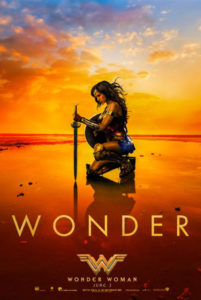 Wonder. That’s what that emotion is called. The thrill of witnessing something impossible brought into being.
Wonder. That’s what that emotion is called. The thrill of witnessing something impossible brought into being.
There’s been just about zero of that in DC films so far. Sure, Christopher Nolan created some wonderful sequences in The Dark Knight and I was in awe of how fiery hot of a dumpster fire Suicide Squad was — but genuine wonder? No, ma’am.
Until Patty Jenkins’ Wonder Woman.
Wonder is hard to kindle. It requires emotional investment. You have to present enough gooey substance and relatable character in order for an audience to believe, even a little. Doing that with superheros is tough. So much of the genre is invulnerable people bludgeoning other invulnerable people in fabricated landscapes over magical doohickeys.
But remember Superman.
“You’ve got me?!” gasps Lois Lane, “Who’s got you?!” And on the street, witnesses, dumbfounded — just like the kids in the theater. And also in awe, as we so rarely are as adults. It’s silly, and cheesy, and wonderful. You want to applaud and cheer and cry, just like Wonder Woman audiences are doing.
At its best, this kind of wonder is the emotion that keeps Wonder Woman ticking. It is a film that looks cheesy straight in the eye and doesn’t flinch. It doesn’t hedge its bets, winking, like Guardians of the Galaxy does, or go full-bore operatic, like Batman v. Superman: The Dawn of Justice. Wonder Woman — when it works — trusts that people have and need genuine emotions to empathize and engage.
Which: duh.
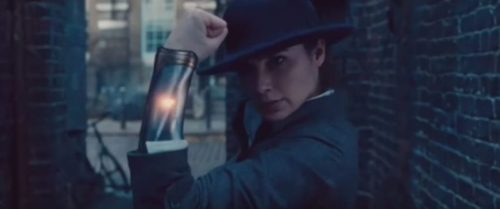 As Wonder Woman starts, it invests in standard backstory beats. These are fine. Young girl. An island hidden by Zeus. An immortal race of warrior women. Diana of Themyscira growing into Gal Gadot, Israeli accent and all.
As Wonder Woman starts, it invests in standard backstory beats. These are fine. Young girl. An island hidden by Zeus. An immortal race of warrior women. Diana of Themyscira growing into Gal Gadot, Israeli accent and all.
This all works, even the accent. The look may be over-polished and gleaming, like airbrushed art on the side of a race car, but it isn’t dull and it doesn’t take long. Gal Gadot, too, is the real deal. Even though Lynda Carter’s voluptuous, 70s TV version of the superhero was my first true love, I say this without hesitation.
Gadot’s version isn’t voluptuous, nor does it make sense for her to be. She’s lean and hard — still more model than soldier, but genuinely both and probably more so than anyone else alive. Her Diana is also naive and headstrong, much as any young person. She doesn’t know what she’s getting into, but she’ll follow her heart there regardless. That earnestness serves as a powerful hook, revealing untempered strength forged harder each day. Again; this is all precisely what kids, regardless of gender, need in a role model. Someone who feels and acts in unison.
Can we hope boys dress as Wonder Woman for Halloween? We can hope.
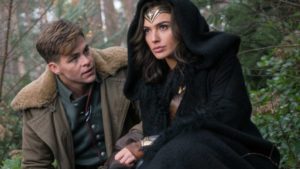 And then Chris Pine‘s Steve Trevor crashes his stolen German plane on Themyscira. The film leaps to London and into the trenches of the Great War. With well-played humor and romance and wonder, Wonder Woman pulls off one of the best second acts I’ve seen in a superhero film for a long time. Let’s say since The Dark Knight.
And then Chris Pine‘s Steve Trevor crashes his stolen German plane on Themyscira. The film leaps to London and into the trenches of the Great War. With well-played humor and romance and wonder, Wonder Woman pulls off one of the best second acts I’ve seen in a superhero film for a long time. Let’s say since The Dark Knight.
Characters come into play — Ewan Bremmer, Lucy Davis, Saïd Taghmaoui — that allow the heroine to expand and persevere and learn. The plot, as silly as in any other superhero story, evolves with Danny Huston and David Thewlis battling over the idea of battle with Diana in the middle. The arch villain, one knows from the start, is none less than Ares, the god of war. Who will that turn out to be?
The answer may or may not surprise you, but it doesn’t really matter. It’s the second act that kills; the climax is significantly less wonderful. It’s largely computer nonsense, the pomposity of which is only accentuated by the smallness of what’s come before, and in whose hands.
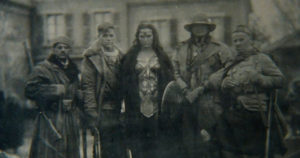 These characters and the actors who play them — for the most part — have fostered a welcome frailty in the picture. That keeps the sense of wonder alive long after one might expect it to fizzle. Gal Gadot is instrumental here, bringing a completely believable strength to her role, but one that she doesn’t fully understand. Her Wonder Woman (a name that is thankfully never mentioned) is only as strong as she manages to believe she can be. The film is essentially the origin story of Diana’s self-actualization.
These characters and the actors who play them — for the most part — have fostered a welcome frailty in the picture. That keeps the sense of wonder alive long after one might expect it to fizzle. Gal Gadot is instrumental here, bringing a completely believable strength to her role, but one that she doesn’t fully understand. Her Wonder Woman (a name that is thankfully never mentioned) is only as strong as she manages to believe she can be. The film is essentially the origin story of Diana’s self-actualization.
This is what I am. This is how the world is. Find your place and kick ass — although if you can do that outside of films directed by Zack Snyder, we’d all be grateful.
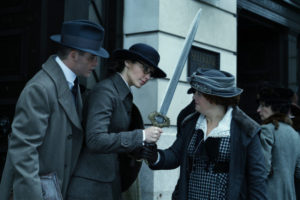 Then the third act devolves into your standard face-off between superhero and supervillain in an out-sized, over-blown final battle that almost, but not quite manages to be important. So many good lessons learned from Superman, but not the last one. If you recall, Superman’s final battle in Donner’s film is one that reveals the fallibility of the Boy in Blue.
Then the third act devolves into your standard face-off between superhero and supervillain in an out-sized, over-blown final battle that almost, but not quite manages to be important. So many good lessons learned from Superman, but not the last one. If you recall, Superman’s final battle in Donner’s film is one that reveals the fallibility of the Boy in Blue.
He can save Hackensack, NJ or the San Andreas Fault from nuclear assault — but not both. (Or not without reversing time via a plot device too silly to mention.)
Wonder Woman dallies with something along this line, but the feint is an afterthought. It isn’t a question of Diana’s inability to overcome — her weakness, her limits — it is just a lesson learned too late. This climax isn’t terrible; it’s just rote and probably the best that Jenkins and the multiple screenwriters could coax past the studio.
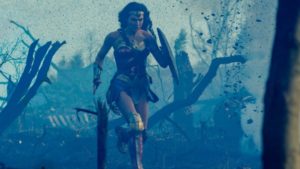 One has hope that Patty Jenkins will demand more leeway for the sequel and get it; she’s certainly earned it. Wonder Woman proves that female directors and female leads and female characters can do everything the boys can do, and better. Of course. Of course, of course, of course.
One has hope that Patty Jenkins will demand more leeway for the sequel and get it; she’s certainly earned it. Wonder Woman proves that female directors and female leads and female characters can do everything the boys can do, and better. Of course. Of course, of course, of course.
Those that pooh-pooh and lament that Wonder Woman hasn’t gone farther in unmasking the patriarchy have missed the point. It isn’t a film that needs to say anything; it’s a film that IS something. Simply existing — and as wonderfully as it does — says everything anyone who is able to listen could possibly need to hear.

Hmm since you guys day it’s good I might actually watch it now.
I genuinely liked it. It’s still a superhero film, but funnier than Guardians, more exciting than Civil War, and almost as romantic as Hellboy (which I have a serious soft-spot for).
I loved ‘Wonder Woman’. The climax was, except for Trevor’s death, anticlimactic; but I suppose Jenkins had to make some sort of nod to the typical “heroic” object-and-body smash fest to get the movie past its illiterate lout of a producer. The ‘no man’s land’ scene was my favorite, and felt like the true climax to me, because that was the moment when Diana turned, deliberately and knowingly, to the path of the hero, and demonstrated the essence of heroism in a way that even Donner’s immortal ‘Superman’ did not: By showing that the greatest power of human heroes is to inspire other people to become extraordinary. That scene transcended the genre of superhero movies and brought Diana of Themyscira* into the company of heroes like Theseus or Odysseus or Arjuna–heroes who taught the people who heard their stories wisdom and heroism in turn, heroes who consciously reflected on the nature of heroism.
Glad you liked it too.
*Argh, Latin and Greek mashed together. Much as I love the movie, this still makes my teeth hurt.